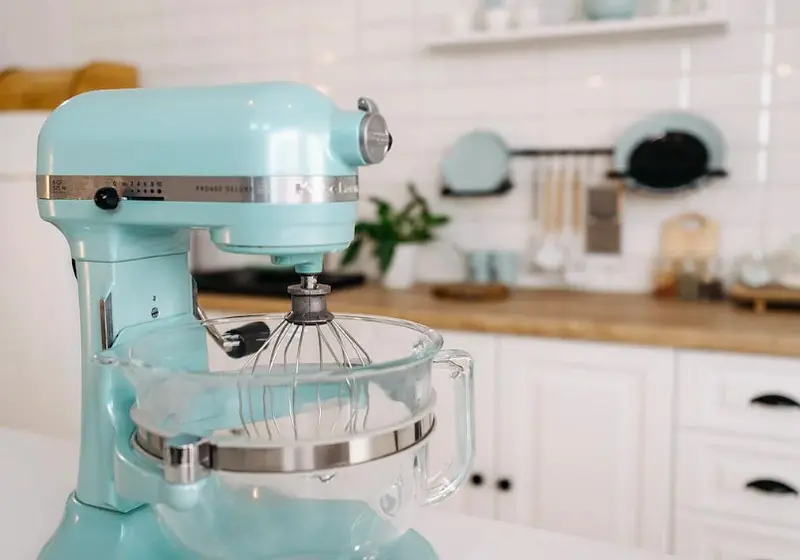How do you start learning how to bake? There's cakes, cookies, scones, bread, and everything in between.
It can seem like a lot when you start learning how to bake - it sure was a lot for me four years ago when I started - and I remember flat cakes, hard cookies, and brownies that would crumble out of the pan. I learnt how to bake myself, using youtube and the food network as teachers, but I often wished I had someone to help me kickstart my journey. Who knows, maybe I would've been further along today if I did. Therefore, this is my guide to you, after failing, failing again, and finally learning how to do things the right way.
Let us slide into your dms 🥰
Get notified of top trending articles like this one every week! (we won't spam you)1. Equipment
Baking requires a lot of different equipment. As a beginning baker, here are some of the things you're going to need when you start to bake. You may already have some of these things lying around at home. I've linked to my favorite brands of all these items.
Things you're going to need:
- A hand whisk - this OXO whisk has such a nice grip on the handle so that even sweaty hands won't slide off! Hand whisking can be a great effort on your bicep and this whisk takes some of the work out of it. Any OXO products have this great handle but compared to the whisk the balloon whisk works better
- Measuring cups and spoons - honestly, any measuring cups and spoons will work fine, but I personally prefer the ones with the flat surface over the rounded surface. I find them easier to work with, but it's just a personal preference and you may prefer the rounded ones.
- Rubber spatula - I like this KitchenAid spatula because of its angled top. Other rounded spatulas like this one don't do nearly as effectively as a job scraping down the sides of bowls. Angled spatulas like the one I've linked scrape down the sides of bowls, especially sticky batter, much more effectively.
- Rolling pin and cutting board - any brand of cutting board and rolling pin will work, but I prefer silicone ones due to their nonstick properties and their easy grip.
- Baking dishes (Sheet pan, Square pans, Cake pans, Loaf pan) - you'll use the sheet pan to make cookies, the square pans for brownies, and other traybakes, the round pans for cakes and cheesecakes, and the loaf pan for bread. I actually prefer silicone baking trays for cookies, but a sheet pan is necessary for certain types of bread and some cakes. If you don't want to get the ones I've linked - make sure you're buying aluminum or nonstick! Glass pans are extremely hard to work with.
- Cake rounds - Any cardboard cake rounds will do. You'll really only need these if you plan to bake and decorate cakes.
- Parchment Paper - I've never tried and tested parchment paper brands, but this Reynolds parchment paper works great for me! Another useful staple for a baker's kitchen is Reynolds cling wrap, but it's not as commonly used as parchment paper.
- Cooking spray - This cooking spray is great! Always make sure to line your pans with parchment paper as a countermeasure, but this PAM cooking spray works great to keep your bakes from sticking to your pan.
Things that are nice to have, but not totally necessary
- Hand mixer or Stand mixer
- Other pans (Bundt cake tin, Cupcake tin, Ramekins, Springform pan)
- Wire cooling rack
- Cupcake box
- Cake stand or cake plate

Take the Quiz: Discover Your Ideal Stress-Relieving Hobby
Everyone deals with stress differently, and finding the right hobby can help you relax and unwind. Take this quiz to find out which stress-relievin...
2. Ingredients
The finest, most quality ingredients are needed to really make your bakes pop with flavor and texture. Not all flours, sugars, and eggs are made equal. Here's a list of crucial ingredients - and links to the ones that give the best results. You probably already have a lot of these at home!
Ingredients you're going to need:
- Flour - I like King Arthur's all-purpose flour, and I even prefer it over other brands like Gold or 5 Star. King Arthur produces softer, fluffier bakes, and the flour itself never gets clumpy as some other brands do. I never sieve when I'm using King Arthur's flour.
- Sugar - any brand of white granulated sugar will do! It's always a good idea to keep some brown or muscovado sugar in your pantry for bakes that require them, though.
- Eggs - any brand of eggs will do! I prefer brown eggs over white eggs in my bakes but I don't think there's too much of a difference in the final product.
- Vanilla Extract - I love this vanilla! It's a bit pricey, but cheaper compared to some of the other ones out there. It's full of flavor and smells really nice. The flavor really carries through only using a teaspoon or two.
- Milk - any whole milk will do!
- Chocolate Chips- Lily's are my favorite because they contain no added sugar, but are still plenty sweet and melt super smoothly. I like to have these in my oatmeal and pancakes too, opposed to some baking chocolates that don't work well in non-oven settings.
- Oil - any canola oil will do.
- Butter - I prefer to use Tillamook unsalted for a smooth and non-chunky finish on cakes. The Tillamook Factory in Tillamook, Oregon is really fun to visit too, if you want to see how they make their butter, cheeses, and ice creams!
- Baking Soda and Baking Powder - any grocery store soda and powder will do!
- Yeast - I feel that red star yeast provides the best raise on bread!
- Cocoa Powder - This Hershey's cocoa powder is my favorite! If you pick another brand, make sure that it's unsweetened. Sweet cocoa powder or hot chocolate mix can mess up the sugar makeup of your bake.
Other fun items to spruce up your bakes
- Sprinkles
- Food colors
- Extracts
- Maple Syrup
- Sour Cream - this sour cream works great but I actually prefer this plant-based sour cream alternative, it actually gives cakes and frostings a light, springy texture (and it's also really yummy with chips and salsa). Regular sour cream will always do the trick though!
- Buttermilk
3. Find a Quality Cookbook
A cookbook chock full of recipes is necessary to start your baking journey. Try out some of these, my tried and tested favorites!
The Cook's Illustrated Baking Book
4. Practice, Practice, Practice!
Nothing good ever comes easy. Keep trying your favorite recipes over and over again in order to further your knowledge of the skills required to become a baker. I've linked some of my favorite free beginner baking recipes below!
- Chocolate Chip Cookies
- Cheesecake Brownies
- Vanilla Cake
- Peach Cobbler
- Apple Pie
- Key Lime Pie
- Vanilla Cheesecake
5. Some Tips and Tricks
- When Baking Cookies: DON'T Roll your cookies into circles and then squash them onto the sheet. DO use a cookie/ice cream scoop and let the cookies flatten themselves out in the oven.
- Use Sour Cream in your cakes: Using sour cream in your cakes will make them softer and fluffier! Even if a recipe doesn't call for sour cream, add about a tablespoon into the mixture before you add your flour mix.
- For Frosting Cakes: Check out this helpful article on how to frost cakes
- For Bread: Let it rise! Don't be too impatient and always wait for your bread to rise for the allotted time.
- For Baking Cakes: ALWAYS use parchment paper, even if you've sprayed and buttered your pans! You never want your cakes to stick to the pan.
6. Don't Be Discouraged!
Your bakes at first might turn out clumpy. They could be underbaked, soft, or even burnt. But, don't give up hope!
It takes a few months before everything you bake comes out cleanly. Then, you don't need to worry about the steps anymore. It's just like playing an instrument or starting a sport.
You might be clunky at first, but after a little while, it will start to come naturally. Push past that first stage and don't give up!
Now, go have fun with your newfound knowledge!











.jpg)

